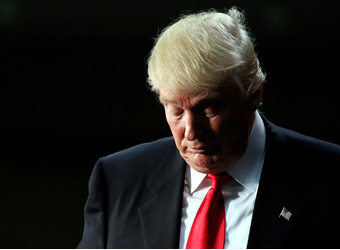Six American business leaders have stepped down from Donald Trump’s manufacturing advisory council after the president’s response to violence at a white nationalist rally over the weekend.
Trump’s reaction to the departures has been repeatedly to attack Merck, the company whose CEO, Ken Frazier, was first to leave, citing on Monday morning “a responsibility to take a stand against intolerance and extremism.”
“Merck Pharma is a leader in higher & higher drug prices while at the same time taking jobs out of the U.S.,” the president wrote in a tweet Monday afternoon. “Bring jobs back & LOWER PRICES!”
Trump reiterated his comments about jobs in a press conference Tuesday, mentioning only Merck of all the companies that left his council. But the president, who said he waited over the weekend to renounce white supremacy groups because “before I make a statement I like to know the facts,” may want to check his facts.
The percentage of Merck employees in the U.S. has remained between 38 and 39 percent since 2011, the year Frazier became CEO.
“Of all the companies to attack, Merck wouldn’t be the one I’d choose,” said Les Funtleyder, a portfolio manager at E Squared Capital, which owns Merck shares. “Clearly the president is making it personal when it really isn’t.” Merck employed about 68,000 people around the world at the end of last year, about 26,500 of whom were in the U.S., including Puerto Rico, according to its annual report.
Merck employed about 68,000 people around the world at the end of last year, about 26,500 of whom were in the U.S., including Puerto Rico, according to its annual report.
Its total number of employees is down by 20,000 worldwide since 2011, as the company cut jobs after its merger with Schering-Plough. But its proportion of employees in the U.S. has remained steady.
“Merck is one of the better companies in the industry as far as keeping jobs around, in terms of drug assistance, and it has a history of being a good corporate citizen,” said Funtleyder, who worked at Merck in the 1990s and is author of the book “Health-care Investing.” Trump’s “criticisms are misguided at best.”
Merck is headquartered in New Jersey, and its principal research facilities are in six U.S. cities as well as in Switzerland and China. Its manufacturing operations are headquartered in Whitehouse Station, New Jersey, and it has production facilities in nine locations in the U.S. and Puerto Rico. Outside the U.S., Merck says it has facilities in Japan, Singapore, South Africa, Western Europe, Central and South America and Asia.
Merck doesn’t provide a breakdown of where its products are manufactured, or a footprint of its manufacturing by employee count. Of 203 open manufacturing jobs listed on Merck’s website Tuesday evening, 86 were in the U.S., the most of any country, followed by 37 in the Netherlands and 23 in Ireland.
“We have more manufacturing employees in the U.S. than we have in any other country and in highly skilled jobs that pay well and generate growth for the U.S. economy,” Tracy Ogden, a Merck spokewoman, told CNBC Tuesday evening. “Nearly $3 billion in manufacturing assets are currently deployed in the U.S. supporting our global supply of products.”
Trump said Tuesday that “some of the folks that will leave” his manufacturing council “are leaving out of embarrassment.”
“I’ve been lecturing them, including the gentleman that you’re referring to, about, ‘You have to bring it back to this country,'” Trump told reporters. “You can’t do it in Ireland and all of these other places.”
There has been an exodus of U.S. health-care companies to Ireland in years past, in the tax inversion craze that saw Medtronic, Actavis and others acquire Irish companies to move their tax base to the Emerald Isle. Pfizer tried to follow suit, attempting an ultimately politically-derailed merger with Allergan (formerly Actavis), and became a target of Trump on the campaign trail.
But Merck’s Frazier has steadfastly refused to consider leaving the U.S. in the same way, saying in an interview with CNBC last year, “We didn’t think doing a large transaction for the purpose of getting tax inversion benefits, which are unquestionably important financial benefits, would be the right way for us to go.”
Trump’s comments Tuesday, in which he unwound previous statements more strongly condemning the supremacy groups involved in the Charlottesville, Virginia, protests, were followed by the fifth and sixth business leaders stepping down from the manufacturing council: Richard Trumka and Thea Lea of the AFL-CIO.
Before that, Frazier was joined Monday by Under Armour CEO Kevin Plank and Intel CEO Brian Krzanich, and earlier Tuesday by Scott Paul of the Alliance for American Manufacturing.
It’s only been Merck, however, that the president has responded to directly, in the press conference Tuesday and Monday on Twitter. But despite his insistence on “knowing the facts,” many industry-watchers argue Trump’s got the wrong target in Merck.
Source: CNBC
